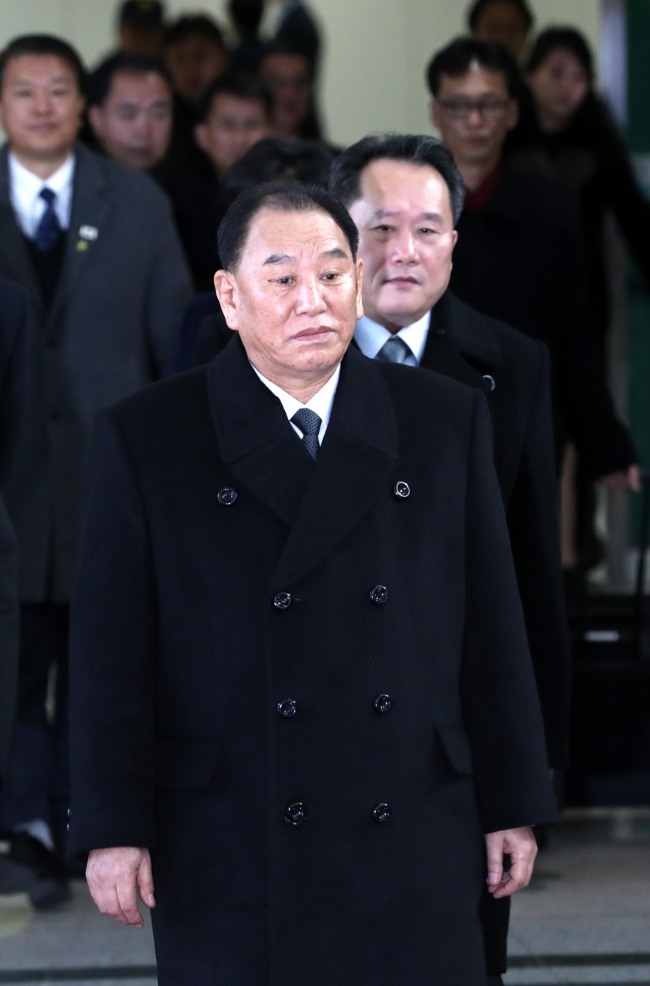NK official accused of masterminding 2010 naval attack visits S. Korea amid protest
By YonhapPublished : Feb. 25, 2018 - 10:56
A top North Korean official accused of having orchestrated the North's sinking of a South Korean warship in 2010 made a high-profile trip to the South on Sunday amid fierce opposition from conservatives here.
Kim Yong-chol, a ranking party official in charge of inter-Korean affairs, crossed the inter-Korean border for a three-day visit, leading North Korea's high-level delegation to the PyeongChang Winter Olympics closing ceremony.
His trip comes during a period of Olympics-driven rapprochement between the two Koreas that follows years of tensions sparked by the North's nuclear and missile programs.
But his visit has been stirring up a controversy here, as Kim, a top military general, is suspected of having masterminded the North's sinking of the South Korean corvette Cheonan on March 26, 2010. The attack left 46 sailors dead.

The deadly sinking took place while Kim was the chief of North Korea's reconnaissance bureau, which is tasked with overseas intelligence operations and cyberwarfare.
A Seoul-led international commission concluded it was torpedoed by a North Korean submarine, but the North has denied the claim.
It is said that Kim was also behind other provocations against the South, including the 2010 shelling of Yeonpyeong Island and the planting of land mines across the inter-Korean border that severely injured two South Korean staff sergeants in August 2015.
With a grim face, Kim did not answer questions by pool reporters about his thoughts on the warship's sinking when he arrived at a checkpoint in Paju, just south of the inter-Korean border.
Conservatives and families of the victims of the sinking have been strongly opposing Kim's visit, lashing out at the government's acceptance of his trip. Opposition lawmakers even called for Kim's execution as a war criminal.
Lawmakers from the main opposition Liberty Korea Party and the victims' relatives held a rally in Paju on Sunday to block his trip to the border checkpoint.
In the face of negative public sentiment, South Korea's liberal government said that the North was blamed for the attack on the warship, but added that it is hard to pinpoint who was responsible for the incident.
North Korea appears to be trying to test South Korea's resolve to improve inter-Korean ties and to drive a wedge among South Koreans by sending a controversial figure to the South, experts say.
The two Koreas held their first formal talks in more than two years last month and restored long-disconnected border hotlines after North Korean leader Kim Jong-un extended a rare olive branch to Seoul in his New Year's message.
The 72-year-old Kim Yong-chol currently leads the ruling Workers' Party of Korea (WPK)'s United Front Department, a unit in charge of relations with the South.
"The government seeks to focus on who could lead practical dialogue to improve inter-Korean relations and bring peace to the Korean Peninsula, rather than to concentrate on who did what in the past," Seoul's unification ministry said.
Kim's trip comes just two weeks after Kim Yo-jong, the younger sister of Kim Jong-un, visited South Korea from Feb. 9-11 as a member to the high-level delegation to the Olympics' opening ceremony.
On Feb. 10, she gave President Moon Jae-in a letter from her brother that included an invitation for the South's leader to go to Pyongyang for a summit at an early date.
Experts said that Kim Yong-chol may deliver a surprising proposal to South Korea, such as the resumption of reunions of families separated by the 1950-53 Korean War.
In exchange for allowing the family reunions, North Korea currently demands that Seoul return 12 women who defected to the South en masse in 2016 after working at a restaurant in China.
The North's leader gave "important" instructions to officials to come up with practical measures to improve inter-Korean ties, Pyongyang's state media said on Feb. 13.
"The North's delegation is likely to offer ways to implement an agreement reached at high-level talks in January. It may suggest the date for military talks or unveil details about family reunions and other exchanges," said Cheong Seong-chang, a senior research fellow at the Sejong Institute. (Yonhap)







![[KH Explains] How should Korea adjust its trade defenses against Chinese EVs?](http://res.heraldm.com/phpwas/restmb_idxmake.php?idx=644&simg=/content/image/2024/04/15/20240415050562_0.jpg&u=20240415144419)











![[Today’s K-pop] Stray Kids to return soon: report](http://res.heraldm.com/phpwas/restmb_idxmake.php?idx=642&simg=/content/image/2024/04/16/20240416050713_0.jpg&u=)